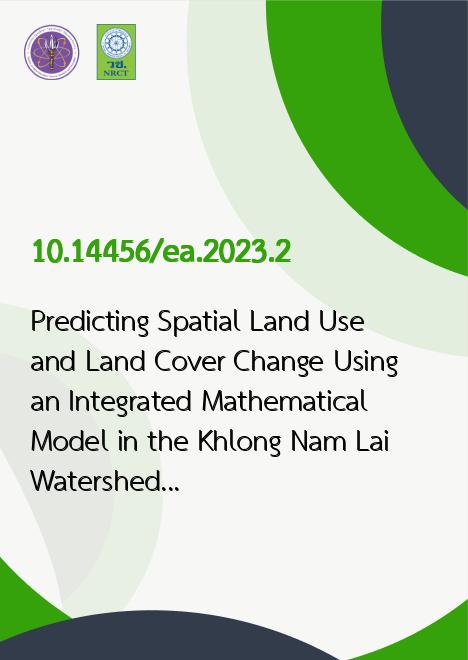
|
Predicting Spatial Land Use and Land Cover Change Using an Integrated Mathematical Model in the Khlong Nam Lai Watershed, Kamphaeng Phet Province, Thailand |
|---|---|
| รหัสดีโอไอ | |
| Creator | Banchongsak Faksomboon |
| Title | Predicting Spatial Land Use and Land Cover Change Using an Integrated Mathematical Model in the Khlong Nam Lai Watershed, Kamphaeng Phet Province, Thailand |
| Publisher | Thai Society of Higher Education Institutes on Environment |
| Publication Year | 2566 |
| Journal Title | EnvironmentAsia |
| Journal Vol. | 16 |
| Journal No. | 1 |
| Page no. | 16-27 |
| Keyword | Land Use and Land Cover Change, Integrated Mathematical Model, Watershed |
| URL Website | http://www.tshe.org/ea/index.html |
| Website title | EnvironmentAsia |
| ISSN | 1906-1714 |
| Abstract | Assessment of land use and land cover (LULC) change in any region is one of the prominentfeatures used in environmental resource management and its overall sustainable development.Tools to measure the past, present, and build a future scenario based on them are necessaryfor an effective evaluation of LULC changes. The changes in LULC are inevitable throughoutthe world, but especially in developing nations. Without the identification of acceptablemethodologies and approaches, the future perdition will be less accurate since LULC is toocomplex and dynamic. The integrated Cellular Automata Markov Chain (CA-Markov) modelis therefore regarded as a capable estimator. The Khlong Nam Lai Watershed (KNLW) LULCalterations were examined in this study using various images and data that were taken fromsatellite data in the years 2001 and 2021 to generate the LULC scenario in the year 2041. Themodel was validated using actual data and projected to the year 2021. The overall agreementon the two extracted maps was 97.23 % in the year 2001 and 96.41 % in the year 2021,respectively. According more detailed analysis of the validation of calibration based on the kappaindex were showed the highest data reliability of 0.97 in 2001 and 0.96 in 2021, respectively.The LULC of KNLW in the year 2041 will undergo changes in the KNLW based on the pastscenario (2001 to 2021). Concurrently, the forest, paddy field, para rubber, and other classescontinue to decline, except cassava, sugarcane, urban, and orchard. The results obtained showedthat the forest class had continued to reduce more than other classes. As a result, the researchcan aid in the prevention of LULC problems affecting life, ecology, and the environment,including developing the necessary planning guidelines for limited natural resources, such asplanning for sustainable watershed management using systematic and sustainable concepts. |